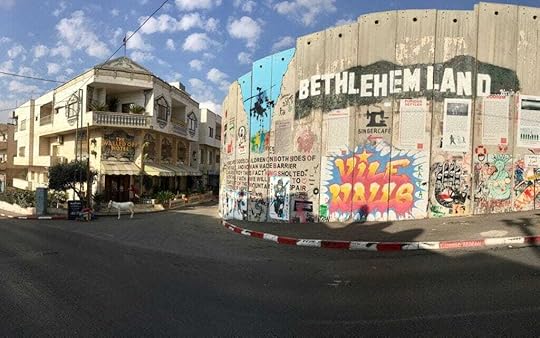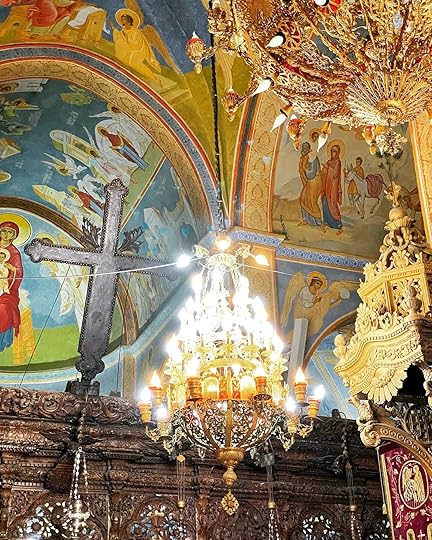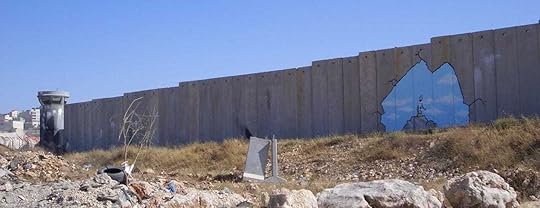Bedlam and Heartbreak Abide in Bethlehem

Tamed Cynic is a reader-supported publication. To receive new posts and all content, consider becoming a paid subscriber.
The terrorist offensive by Hamas into Israel earlier today started me to reflect on my recent experiences in Bethlehem in the West Bank.
Here is the piece I wrote during my time there:
As you enter and leave the Orthodox Church of the Annunciation in Nazareth, you can’t help but see— you’re encountered by— a large fresco on the ceiling illustrating the Slaughter of the Innocents. Joseph carries baby Jesus, like an emergency go-bag thrown over the shoulders as an invading army’s artillery gets too close for comfort. In the bottom right hand corner of the scene— soldiers with blood orange swords kill children on a jealous tyrant’s orders. It’s a reminder of the cost that comes with Mary’s “Let it be with me according to thy word.”
Every Feast of the Incarnation I make a point to begin my sermon by reassuring folks that, no matter how disarrayed their life is generally or their Christmas Eve particularly, there is a place at the manger for them. It’s all too easy for those who crowd into church on Christmas to conclude that the bedlam in their lives somehow disqualifies them from befriending the Holy Family. This is a judgment that is as odd as it is commonplace. At least according to the scriptures, the first Christmas was no less clamorous and chaotic for Mary and Joseph than it is today for the brothers and sisters of their child.

Despite what we sing on Christmas Eve, it was not a silent night. According to the Gospel of Matthew, sometime after the shepherds returned to their flocks and the magi found a different route home, after Mary and Joseph wrapped him in bands of cloth and laid him in a trough, all the other mothers and fathers of sons in and around Bethlehem lay their babies in their cribs and tuck their toddlers into bed.
And while they sing them a lullaby or tell them a Bible story or kiss them goodnight on the forehead, they hear:
The sound of boots stamping down the dusty roads
The sound of doors being knocked on and kicked down
The scraping sound of metal on metal as swords are unsheathed
The chaotic sounds of orders being shouted
And fathers being shoved aside
And mothers gasping
And babies being taken.
Mary and Joseph sneak away across the border with no money to their name. Luke’s nativity tells us about the angels who sing, “Glory to God in the highest heaven.” But Matthew tells us those same skies fill with the cries of mothers and fathers as their sons are silenced forever.
The Gospel of Matthew tells the Christmas story with the steely-eyed recognition that this world often resists our stubborn sentimentality and is frequently and shockingly horrible. It’s a world where despots plot and evil flourishes and the innocent are victims. It’s a world where the poor are powerless and the powerful do whatever they please and long suffered injustices fester.
The unease many churchgoers feel on Christmas Eve is but a distant, thin ripple downstream from the bedlam that marks God’s arrival into the world at Bethlehem.
As Fleming Rutledge puts it, Christ is born with monsters at his manger.
Which makes it both totally fitting and appallingly poignant that the bedlam and heartbreak of his birthplace abides.

Today, the minaret of a mosque stands opposite Nativity Square, seemingly unmoved or unimpressed by the Gospel’s claim that the crèche a block away is the cradle of creation. A busy street laced with street lights and crosswalks snakes past the Church of the Nativity. The honking horns of cars caught in traffic and the whistles of policemen at intersections interrupt the solemn prayers of the pilgrims who all bow in humility as they enter through the short church doorway.
Crossing over from Israel into the Palestinian Territory and the West Bank, I had to go through a security checkpoint to reach Bethlehem.
Graffiti, both righteously angry and winsomely prophetic, covers the West Bank Barrier and stands as an omnipresent backdrop to the gilded leaf altar of the Orthodox Church of the Nativity. Today, the city of Christ’s birth is guarded not by heavenly host but by Palestinian police controlled by the Israeli military.Due to the confusing apartheid-like system of classifying Palestinian Muslims and Christians, only some of the residents of the Holy Family’s city can leave it for the City of David. As a consequence, young men loiter the streets around the site of Christ’s birth with nothing to do, no dreams to entertain or hopes to harbor— unemployment in the West Bank exceeds the worst of the American Depression in the 1930’s. Even the staff at the hotel here in Bethlehem, good jobs to be sure, make less than $700 a month.
Visiting the place of Christ’s birth for the first time, I can’t shake the suspicion that we often drape the Christmas story in sentimentality for self-serving reasons and that the gloss with which we redact the text has victims more serious than the visitors who feel slightly uncomfortable in our pews.
Those who can most identify with the way King Herod thrusts innocents into the gears of geopolitics are precisely those who live in Bethlehem today— a city that remains Christian— caught in the quagmire of the Israeli-Palestinian “conflict.”
At the same time, I can’t avoid the truth that it’s Christians in America who are least likely to identify with the Christians in Palestine.
They can see themselves in Matthew’s frighteningly everyday story while we celebrate it with warm candle glow and tender lullabies. It turns out that, two millennia later, paying homage to the place of his birth is no less complicated than was the occasion of his birth. And honestly, sitting here in the Hotel Saint Gabriel in the West Bank, the situation in Bethlehem feels every bit as hopeless as it must have the day Herod’s soldiers rolled through with their blood orange swords. And then— the silence that ensued.
This surprising, disquieting equivalence between the bedlam of Bethlehem then and now left me yesterday longing for the Church of the Nativity to offer me more. More than a short door that necessitates a work of humility. More than a crèche stone rubbed smooth by the adoring hands of pilgrims. More than a dizzying array of colorful icons and paramount covered walls.
I needed a word.I needed a promise.The Church of the Nativity needs, I concluded, a preacher.
And it doesn’t need to be someone in a collar or robe. It doesn’t need anyone swinging a chain and censor or a standing astride a pulpit. A guy with a sandwich board and megaphone on the street corner would do.
As much as ever, the place of Christ’s birth needs the promise declared at his birth— the promise that the Light yet shines in the darkness and the darkness has not and does not and WILL NOT overcome it.
The promise just has to be true.
Because we, with our alleged free will, have not come up with any solutions.
And as for me, I’ve got nothing.
For me, faith only ever feels like a gift.
 Get more from Jason Micheli in the Substack appAvailable for iOS and AndroidGet the app
Get more from Jason Micheli in the Substack appAvailable for iOS and AndroidGet the app
Jason Micheli's Blog
- Jason Micheli's profile
- 13 followers



